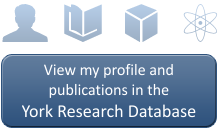Dr Andrew Mason
Lecturer
Research
Research
My broad aim is to use sequencing data to understand carcinogenesis and to stratify cancers and other diseases in biologically and clinically relevant ways to derive more personalised treatments. My research has two main areas: characterising human urothelial carcinoma, and understanding the impacts of endogenous retrovirus interactions in avian and human cancers.
As part of the York Against Cancer funded Jack Birch Unit for Molecular Carcinogenesis, I focus on urothelial carcinoma (UC): cancers found in the bladder and upper urinary tract. UC is a relatively understudied group of diseases, despite approximately 10,000 diagnoses in the UK every year. Of these, ~95% are bladder cancers, but cancers of the upper urinary tract (renal pelvis and ureter) are grouped in together, despite the urothelium having a different embryological origin.
My work investigates the clinical application of sequencing technologies to urothelial carcinoma diagnosis and treatment, both from the bladder and upper tract. Our perspective is built on a bioinformatic understanding of the healthy human urothelium from our work across the Jack Birch Unit. We utilise short and long read RNA sequencing technologies, and have begun to use single-cell transcriptomics to understand urothelial cellular identity in normal and malignant tissues.
We use ATACseq (bulk and multiome) to investigate epigenetic dysregulation, as well as whole genome sequencing to interrogate mutational signatures. We use publicly available datasets to ask specific biological questions to better inform clinical subtyping and derive more personalised therapeutic approaches. I am also one of the bioinformatic leads analysing bladder cancers in the Genomics England 100,000 Genomes Project.
My other core area of research focuses on endogenous retroviruses (ERVs), building on my PhD and initial postdoctoral research. ERVs are the genomic remnants of historical retroviral integrations within the germline. Whilst most ERVs degrade over evolutionary timescales, more recent integrations can continue to affect host physiology through genomic and exogenous retrovirus recombination, insertional mutagenesis, retroviral antigen presentation, and receptor interference.
Our current research focuses on endogenous Avian Leukosis Virus (ALVE) integrations in chicken, and how these modulate infection dynamics with other viruses, initiate spontaneous lymphoid leukoses, and impact production traits. Beyond commercial and small holder applications, my work has been used to annotate ALVE diversity in the reference chicken genome and chicken pangenomes built from diverse breeds and commercial stock. As a lab, we aim to transfer these skills to human retroviral cancers in the near future.
Teaching and scholarship
Undergraduate projects
I offer computational projects in cancer genomics and transcriptomics, working with data generated at York as well as large public cohorts such as The Cancer Genome Atlas (TCGA) and the Genomics England 100,000 Genomes Project. Students will work with me directly for the duration of their project and learn highly translational data analysis skills for working with “big data”.
Postgraduate projects
I support PhD and Masters by Research students as a project supervisor, typically in bioinformatics-focused projects relating to human or avian cancer biology. I am open to self-funded students.
Undergraduate teaching
I teach on the new Stage 3 Genomics module, delivering cutting edge material on the broad application of genomics and sequencing technologies across biology. This course is front loaded with information about the diversity of genomes, and of the technologies used to study them. We then dive into workshops, giving you skills in data analysis of large sequencing data. The exciting thing is that the data are new - we have some ideas what might be there, but the final report will be describing new biology. Students will learn how to interpret and present genomic data, work at the Linux command line, and discuss the ethical implications of working with such identifiable data.
I'm also part of the data science team for the Becoming a Bioscientist modules taken by all Biology undergraduates. I will help students develop skills in R for the analysis of transcriptomic (RNAseq; gene expression) data, and lead a series of tutorials based in my own research.
Postgraduate teaching
I am part of the teaching team for the new MSc in Bioinformatics. I'm also available to give advice on coding, data science and statistics to all research students.
Data Stewardship
I am a Data Stewardship training fellow in the UK node of the pan-European Elixir organisation. Elixir offers training, resources and support to life scientists generating all type of biological data. Our aim is to make all biological data open and FAIR: findable, accessible, interoperable (ie you can combine it with other resources) and reproducible. I have developed various online resources aimed at explaining sequencing data, and delivered in house training from school students to professors.

Contact details
https://asmasonomics.github.io/

